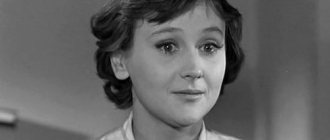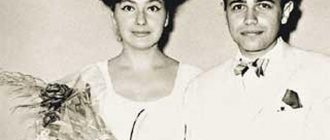A world-famous lyrical poetess of the Soviet era with an extraordinary destiny, a sensitive soul and an unshakably honest civic position. Her poems are special, with some elusive aroma of mystery, sadness and depth, which can only be felt without understanding what it was. But it happened!.. Her poems were read by people of all ages, and songs and romances were made from them. Even without knowing her name, people listened to them with bated breath. And the concert halls could not accommodate those wishing to attend her performances.
What else do we know about this amazing woman - Bella Akhmadulina? How did her life turn out, why was there always a note of sadness and a certain detachment, withdrawal into herself, into her inner world? What are the main facts of Bella Akhmadulina’s life? What happened to her in her personal life? Let us very carefully touch on this acquaintance with the dramatic life of the great and talented Bella Akhmadulina.
Bella Akhmadulina – Wikipedia
Bella (Isabella) Akhatovna Akhmadulina is a Russian poetess, writer, translator, one of the largest Russian lyrical poets of the second half of the twentieth century. Member of the Union of Russian Writers, the executive committee of the Russian PEN Center, the Society of Friends of the Museum of Fine Arts. A.S. Pushkin. Honorary member of the American Academy of Arts and Letters. Laureate of the State Prize of the Russian Federation and the State Prize of the USSR.
And these are not all the titles and titles of a woman who lived not for their sake, but at the behest of her soul and conscience, and fulfilled the task of life.
Bella Akhmadulina - biography
The famous poetess was born on April 10, 1937 in Moscow. She had an intelligent family. Bella's father, Akhat Valeevich, worked in the party and Komsomol service and was a deputy minister. Mother, Nadezhda Makarovna, was a KGB translator.
Initially, the girl was given the name Isabella according to the then fashion of Spanish preferences. Later the girl changed her name, shortening it to what is now known.
Her maternal grandmother Nadezhda Mitrofanovna played a big role in raising little Bella; the reason for this was the busyness of her parents. The grandmother taught her granddaughter to read; together they read both fairy tales and Russian classics. Akhmadulina carried this love for literature throughout her life; it became her innermost essence and meaning of life, embodied in numerous works of the poetess and writer.
The war did not allow the girl to go to school on time; she and her grandmother were sent to Kazan, where the family of her father, who was at the front, was located. There Bella suffered a dangerous illness, which she was able to cope with only with the arrival of her mother.
Only after returning to Moscow did Bella go to school, but studying among her peers was a burden; she was much happier alone with herself and books. Therefore, being extremely well-read, she felt like a fish in water in literature and devoted all her time to her favorite literature. The same cannot be said about other items, which were often passed over and ignored.
During her school years, Bella wrote poetry with all her might, and by the age of 15 she had her own established literary style. The talented girl was a member of the Literary Association, a literary circle at the plant named after. Likhachev, her first publications in the magazine “October” at the age of 18 are associated with this period.
After school, there was an attempt to fulfill the wishes of her parents in the journalistic field, but fate did not allow Bella to take up an alien occupation - she failed the entrance exam. And the next year I entered the literary institute that I dreamed of. At this time she already had decent creative experience and fame.
But as a student, Bella’s uncompromising principles in her life principles, which did not tolerate a deal with her conscience, also manifested themselves. At that time, Boris Pasternak was hit with a barrage of accusations of treason, including demands for expulsion from the country. The reason was the Nobel Prize in Literature. Signatures were collected among university students for such an accusatory letter, which Bella did not agree to sign, for which she was expelled. She was later restored, thanks to the help of a newspaper editor, for whom the young girl worked at the time.
In 1962, the first book of poems, “String,” was published, which was a huge success, despite criticism for its intimacy and pomposity, which were not typical of Soviet writers.
The second collection of poetry was published in 1969 and was called “Chills.” And then followed “Music Lessons”, “Blizzard”, “Poems”, “Candle”... The poetess was a tireless worker, completely devoting herself to creativity, she created in any condition and in any place.
Bella Akhmadulina's civic position
Bella Akhatovna did not stand aside from the events taking place in the country and its politics. She was painfully wounded by injustice, for the restoration of which she took all possible steps.
Even as a student, she did not make a deal with her conscience and refused to sign a letter of accusation against B. Pasternak for receiving the Nobel Prize, which was considered a betrayal of the Motherland, and the Soviet government incited the public against him. Bella was even expelled from the institute under the pretext of failing an exam.
She was a supporter of the disgraced Sakharov, Solzhenitsyn, Kopelev, defended and supported them with her appeals and speeches in foreign radio and press, and wrote essays about them.
In 1978, Akhmadulina took part in the publication of the Metropol almanac, which collected the works of many talented authors who were denied official publication of their books. This collection, made in a handicraft way, in a typewritten version, had a circulation of 12 copies, one of which was illegally exported to America and republished there. Harsh criticism and persecution immediately followed the participants in the uncensored almanac.
“Letter of Forty-Two” is the name of a collective appeal to the president demanding a ban on parties in 1993; Bella Akhmadulina was among its signatories. And in 2001, the poetess came to the defense of NTV.
Young poetess with a civic position
Bella Akhmadulina was born in Moscow in 1937. The Spanish name Isabella was chosen for her by her grandmother. “I realized it early and shortened the name to Bella,” said the poetess.
Akhmadulina’s first poems were published in 1955 by the magazine “October”. She was then in the tenth grade, studying in the literary circle of Evgeniy Vinokurov at the Likhachev plant.
After school, Bella Akhmadulina entered the Literary Institute named after A.M. Gorky. The young poetess read her own poems to the selection committee. In her first year, she was already a fairly well-known author. At the age of 22, Akhmadulina wrote the poem “On My Street Which Year...”, which became a famous romance.
Excerpt from the film “The Irony of Fate, or Enjoy Your Bath!”
Three more years later, the poetess released her first book of poems, “String,” about which Yevgeny Yevtushenko wrote: “It was no coincidence that she called her first book “String”: the sound of an extremely stretched string vibrated in her voice, and you even became afraid that it might break. <…> The voice magically shimmered and bewitched not only when reading poetry, but also in simple everyday conversation, giving a lacy pomp to even prosaic trifles.” .
Akhmadulina’s performances attracted full halls, squares, and stadiums. Not only the poetess’s voice was special, but also her artistic style. Bella Akhmadulina used interesting metaphors in her texts and wrote in the style of the golden age.
“My lyrical heroine, she has an origin even earlier than the twentieth century.”
Bella Akhmadulina
In 1958, students of the Literary Institute, including Bella Akhmadulina, were forced to sign a collective letter demanding that Boris Pasternak be expelled from the country. At that time, the persecution of the writer related to his Nobel Prize was in full swing. The poetess refused to sign the letter. And soon she was expelled, officially for failing an exam in Marxism-Leninism. However, Akhmadulina was later reinstated, and she graduated from the Literary Institute with honors.
“If the Literary Institute taught me anything, it was how not to write and how not to live. I realized that life is partly an attempt to defend the sovereignty of the soul: not to succumb to temptations or threats.”
Bella Akhmadulina
Bella Akhmadulina - creativity
People flocked to Akhmadulina’s concerts, packing large halls. She had a special artistic style that imparted a certain old-fashionedness, archaism, similarity to the pathos of the last century, but at the same time very rich in metaphors and bizarre images. The ordinariness of the sound contrasted with grandiosity and sensuality.
But what is most important is that each poem was born in the heart of the poetess; it carried vitality and sincerity, conveyed feelings and found a lively response in the souls of listeners and readers. Connoisseurs of her gift believed that Akhmadulina had the style of the golden age of Russian literature.
The magical, strong voice of the poetess, when she read her poems, vibrated with such a taut string that it did not leave anyone indifferent and forced a person to empathize, awakened his soul, conscience, and excited his feelings. Like a tuning fork, it set me up to think about life and raised me to high truths.
Throughout her life, Bella Akhatovna carried love and reverence for her teachers, who influenced her entire life and work - these are Akhmatova, Tsvetaeva, Pasternak and Mandelstam.
33 collections of beautiful poems are the main result of Bella Akhmadulina’s creative life. Plus many articles, essays, translations by foreign authors.
Akhmadulina is a banned author
Akhmadulina was loved in the country and abroad, she was known and respected, translated into all languages of Europe, and this authority protected her from repression in many situations. But still, she was unable to avoid the fate of all the progressive people of the “stagnant” Soviet period, and after the publication of the book “Chills” outside the country (Frankfurt), the poetess was subjected to harsh criticism and censorship.
Publishers refused to publish it, and a ban was imposed on public appearances. And this continued until the start of perestroika. In disgrace, the poetess continued to write a lot, essays about many famous people appeared in her work, such as Nabokov, Akhmatova, Tsvetaeva, Vysotsky and other talents; she was personally acquainted with many of them and was even friends.
Akhmatova translated poems by many foreign poets, and in 1984 she was awarded the Order of Friendship of Peoples.
Bella Akhmadulina’s stay in Georgia is also connected with this period, which made an indelible impression on Akhmadulina, especially Tarusa, which became the poetess’s favorite place, her muse. The collection “Dreams about Georgia” and many translations of poems by outstanding Georgian poets were born here.
Akhmadulina in cinema
In her youth, Bella Akhmadulina starred in two films. This is the role of a journalist in the film “There Lives Such a Guy” by Vasily Shukshin, which received a prize at the international festival in Venice in 1964. The second film was “Sport, Sports, Sports” by Elem Klimov, in which Akhmatova read her own poems dedicated to athletes.
Akhmadulina’s poems and songs have become the hallmark of famous paintings: the romance “On My Street...” in “The Irony of Fate” by Eldar Ryazanov. In “Office Romance,” the heroine’s internal state is conveyed by the poem “Oh, my shy hero.” In “Cruel Romance” by Nikita Mikhalkov the romance “And finally I will say” sounds.
What was the poetess like?
Akhmadulina always loved to dress well so that admiring glances would be focused on her. A woman never went out without a carefully created image. Bella loved all kinds of creative experiments. Without hesitation, she accepted Shukshin’s offer to star in the film “There Lives Such a Guy.” In the film, Bella practically played herself. Now the tape is the most reliable source of information about how the young poetess looked and worked.
Akhmadulina’s evenings always attracted a huge number of people. And it wasn’t just the woman’s poetic gift. The evenings had a special atmosphere that attracted listeners. Many people liked the unique warmth and sincerity of the atmosphere. Love and sincerity emanated from the poetess. She knew how to influence the people around her in some amazing way, generously giving not only her talent, but also a piece of her soul.
In many photos she is depicted with a cigarette and a glass in her hand. This became part of her image and a reason for gossip and rumors. It is difficult to find a literary figure who would receive so many dirty slander. What was the woman accused of?
Only the young will understand. Nikita Presnyakov explained why not everyone loves his music
Homemade cured bacon. Grandma gave me a recipe for a delicious hearty dish
Where did Russian nobles get a lot of money for a rich life and what did they spend it on?
Bella Akhmadulina - personal life
This woman was beautiful and charming, many men liked her, people fell in love with her, and there were crowds of fans, and there were novels and meetings.
The poetess had four marriages during her life, which fell apart one after another, and only the last one brought her long-awaited consolation. Each of her husbands loved and admired her, they dedicated poems of love to her and showered her with flowers. But this was love not so much for a woman as for a great and talented poetess. And she had her own principles, her own opinion on various issues, her own standards of good and evil, her own human and feminine characteristics, which cannot be ignored. Instead of unconditional love, they tried to correct, educate and remake her, which could not but leave an imprint on Bella’s delicate nature.
Bella Akhmadulina's husbands
The poetess's first husband at the age of 18 was Yevgeny Yevtushenko. He was the first connoisseur of her poetry much earlier, during her school years. Then they met again at the institute and, being close in nature, were strongly attracted to each other and became friends, but their romance did not begin immediately. Her husband doted on her, dedicated poems and declared his love - the couple were happy. But their marriage cracked due to Bella’s pregnancy, since Yevtushenko did not allow the child to be born. And this was the reason for the subsequent separation of the young couple.
Bella Akhmadulina’s second husband was Yuri Nagibin, a writer, journalist and screenwriter. Their meeting took place very soon after the divorce from Yevtushenko, in 1959. Nagibin had the gift of making women fall in love with him. And this marriage was neither his first nor his last; Bella became his fifth wife. Having been married for 9 years, Nagibin, on his own initiative, broke up with Akhmadulina. We will not delve into gossip about this, without having a reliable interpretation, but the fact is that she did not want to end the relationship. Be that as it may, the divorce took place, and after it the poetess, perhaps in confusion of feelings and disappointment, took the girl Anya from the orphanage, adopted her and gave her the surname and patronymic of her now ex-husband.
Akhmadulina’s next, third husband is Eldar Kuliev, 17 years younger than her. Where he came from in her circle, what attracted them to each other is unknown, but first a friendly relationship arose between them, and then they developed into a romance, which resulted in the birth of their daughter Lisa. Actually, this marriage saved Akhmadulina from deep depression after a previous divorce, but after the birth of the child, their relationship dried up.
Just a year later, Bella met her main man, destiny, who became her fourth husband, with whom they lived until the end of her life. This is Boris Messerer, sculptor, theater artist, set designer, who from the first meeting realized that he would go to the ends of the earth for this woman. He surrounded her with love and care, relieved her of the life that burdened her by hiring a housekeeper. He understood her tender poetic nature and anticipated her desires and difficulties. Yes, they truly loved each other and were happy. Out of this great love, after the death of his wife, Messerer created a monument in honor of his wife and greatest poetess, installing it in Tarusa in 2013.
Children of Akhmadulina
In her first and second marriages, the poetess had no children. But after her divorce from her second husband, Bella adopted a girl, Anna, from an orphanage, giving her his last and patronymic names.
In her third marriage in 1973, Bella Akhmadulina gave birth to her only natural daughter, Elizaveta Kulieva.
When the poetess married for the fourth time, both daughters remained in the care of Bella’s parents. Despite rare meetings with their mother, love, warmth and understanding of each other remained in their relationship.
Elizabeth followed in her mother's footsteps and also became a writer. After her mother's death, she published the book “Bella. Meetings afterbirth”, which reflected the main events of her life. Sharing her childhood memories, Lisa noted her mother’s ability to create happiness for her loved ones, especially her children. She made children's birthdays an unforgettable, bright holiday. She taught her daughters to live according to conscience and honor, the way she herself lived.
According to her daughter, Bella loved life very much, in all its manifestations, and devoted herself to this life to the end. This love and joy of life were the essence of Bella, and only the public created her tragic image. And Lisa loves this childish, enthusiastic joy from life most of all in her mother.
Creativity[ | ]
For Akhmadulina, poetry is self-revelation, a meeting of the poet’s inner world with the world of new (tape recorder, airplane, traffic light) and traditional (candle, friend’s house) objects. For her poetry, everything - even any little thing - can serve as an impulse, inspire a bold fantasy that gives birth to daring images, fantastic, timeless events; everything can become spiritualized, symbolic, like any natural phenomenon (“The Tale of the Rain”, 1964). Akhmadulina expands her vocabulary and syntax, turning to archaic elements of speech, which she interweaves with modern colloquial language. The alienated use of individual words returns their original meaning in context. It is not statics, but dynamics that determine the rhythm of Akhmadulina’s poems. At first, the share of unusual things in Akhmadulina’s poems was very large compared to most Russian poems of that time, but then her poetry became simpler and more epic.
— Wolfgang Kazak[20]
However, for all her refined, eloquent, outdated vocabulary, Akhmadulina was and remains an absolutely modern poet - the late 20th and early 21st centuries. How did she achieve this? There are practically no signs of modern times, there are practically no abbreviations and slang in her poems, there are very few colloquial words, although they are extremely expressive (motley, shame, money, soprut, cemeteries), fashionable Anglicisms are in just a few poems.
And, finally, the main thing: Akhmadulina proved herself to be a true reformer of verse, first of all, of rhyme, and rhyme is, of course, the most important part of the form in a syllabic-tonic poem. Akhmadulina has practically no banal rhymes. All rhymes are unexpected, new, non-repetitive, and almost never found in other poets.
— Evgeny Stepanov[24]
Literary critic I. Snegovaya, who was present at the Akhmatov evening with the participation of Akhmadulina in 2008, notes her poems dedicated to Repino and Komarovo, written in these places. The feeling of the past time, fascination with the appearance of old dachas and reflections on the fate of their inhabitants form the content of these works. “Her presence at the Akhmatov evening was so appropriate and joyful for the listeners. The Beautiful Lady of modern Russian poetry, she continues the classical tradition with her exquisite appearance and style, and in her poems addressed to Akhmatova, admiration and controversy live, without which there is no continuity”[25].
Joseph Brodsky called Akhmadulina “the undoubted heir of the Lermontov-Pasternak line in Russian poetry”[7].
The complete and conscious blurriness of Akhmadulina’s poetry, similar to impressionism in painting, is noted by Dmitry Bykov. Complicated by a labyrinth of associative moves, the difficult-to-remember poems nevertheless leave the reader with “a feeling of an integral and beautiful image, selfless, combining dignity with shyness, knowledge of life with helplessness, downtroddenness with victoriousness.” The running theme of Akhmadulina’s work, the literary critic points out, was shame
, which “accompanied her all her life and was dictated in many ways by the disorderly, too turbulent life that she had to lead.” This dominant theme, Bykov believes, was reflected in “the same lack of creative will, which sometimes forced her to prolong poetry beyond the prescribed limit, enter into unnecessary relationships, and drink with unnecessary people.” According to the biographer, Akhmadulina, with her inherent painful sinfulness and bitter self-condemnation, continues the poetic tradition of Boris Pasternak: both lyric poets, both in life and in poetry, were related by pomposity, pomposity, verbosity, courtesy, shyness; these qualities, surprising those around them in everyday life, were “human traits among inhumanity, a breath of warmth among the icy world”[5].
On February 9, 2013, speaking at the first Congress of Parents, Russian President V.V. Putin called for the inclusion of Akhmadulina’s poems in the compulsory school literature curriculum[26].
Bibliography[ | ]
- “String” (M., Soviet writer, 1962)
- "Chills" (Frankfurt, 1968)
- "Music Lessons" (1969)
- "Poems" (1975)
- "Candle" (1977)
- “Dreams about Georgia” (1977, 1979)
- "Blizzard" (1977)
- almanac "Metropol" ("Many dogs and a dog", 1980)
- "Mystery" (1983)
- "The Garden" (1987)
- "Poems" (1988)
- "Selected" (1988)
- "Poems" (1988)
- "Coast" (1991)
- "Casket and Key" (1994)
- "The Sound of Silence" (Jerusalem, 1995)
- "Ridge of Stones" (1995)
- “My Very Poems” (1995)
- "Sound Indicating" (1995)
- "Once Upon a Time in December" (1996)
- "Contemplation of a Glass Ball" (1997)
- “Collected works in three volumes” (1997)
- "A Moment of Being" (1997)
- “Despair” (poems-diary, 1996-1999)
- “Near the Christmas tree” (1999)
- “An ancient style attracts me” (2000)
- “My friends have beautiful features” (2000)
- “Poems. Essay" (2000)
- "Mirror. XX century" (verses, poems, translations, stories, essays, speeches, 2000)
- “Button in a Chinese Cup” Pushkin Foundation, (2001)
- "Chilled Hyacinth" (2008)
- “Button in a Chinese Cup” Olympus, (2009)
- “Favorites” (poems, poems, essays, translations, 2009)
- “Not a Word about Love” (2010)
- "Desperation" (2011)
Filmography[ | ]
Acting works[ | ]
- 1964 - Zastava Ilyich - cameo
- 1964 - There lives such a guy - a journalist from a regional youth newspaper
- 1970 - Sports, sports, sports - cameo
- 1976 - Non-transferable key - cameo
Screenwriter[ | ]
- 1965 - Chistye Prudy
- 1968 - Stewardess
Using poetry[ | ]
- 1964 - Zastava Ilyich
- 1973 - My friends... (film almanac)[27]
- 1975 - The Irony of Fate, or Enjoy Your Bath! “On my street”, performed by Nadya (Alla Pugacheva)
- “Chills” (“Oh, my shy hero”), read by Svetlana Nemolyaeva
- "Don't give me too much time", song behind the scenes
- “Come on stage” (“I came and I say”), performed by Alla Pugacheva
- “And finally, I’ll say it,” performed by Valentina Ponomareva
Death
The greatest poetess passed away on November 29, 2010 after a serious illness in Peredelkino, near Moscow, where she and her husband lived in recent years.
By this time she was almost blind, which was the main suffering of her creative soul, since she could not write. According to Elizabeth’s daughter, this was the main cause of death; in fact, Bella herself launched a program of self-destruction, since she could not endure a useless existence.
They say she had cancer, but she died of an acute heart attack in an ambulance. She was buried at the Novodevichy cemetery in Moscow. After the death of his beloved wife, Messerer wrote a book of memories about her, and in 2013 he created a monument in honor of Bella Akhmadulina in Tarusa.










